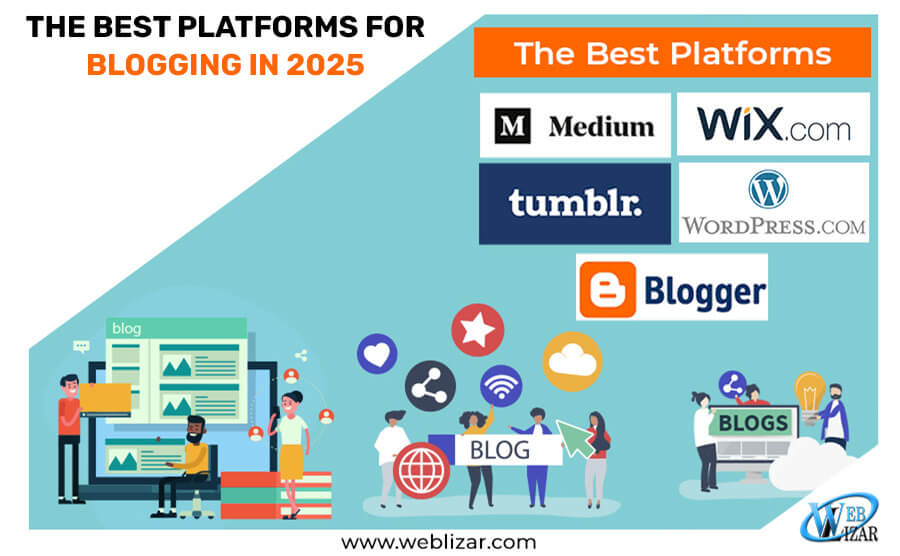The Best Platforms for blogging in 2025

Running a blog is a regular thing in 2025. Everybody from a student to a retired lawyer has their own hosted website. People use it for different purposes. Some make money, some share reviews or use it as a public diary. Here are some examples of using different blogging platforms:
– Cuts and Bruises Barbershop created on Wix.
– evolutionwriters reviews page on a blog hosted by wordpress.com.
– Jesse Weaver’s publications on Medium.
The WordPress started a new era in blogging. People have an opportunity to create a customized website without spending a dime (not always). There are many services on the web offering using their platform. This article will help you to choose a suitable website according to your goals.
Before choosing a blogging platform it is necessary to define what you’re looking for. If it is your first experience you will want an easy builder that doesn’t require any coding skills. You may want to change your blog’s appearance with the grow of its popularity. Probably, you will start making money and you’ll have to make it secure. You should keep in mind what kind of blog
you are creating now and what it will be in the future. When pondering is done you can start reading the pros and cons of the best blogging platforms for beginners:
Wix.com
Wix is a website builder that doesn’t require any special coding skills. Simple drag and drop tools let you create a stunning website in minutes. Also, you can add a blog section to your website using the Wix Blog app. 110 million users currently have a Wix’s website across the globe.
Pros
– Quick and easy setup.
– You can build a website even if you don’t know what HTML is.
– Fascinating customizing utilities.
Cons
– The free membership is strongly limited and you have to pay for the coolest features.
– You can’t change a chosen template.
– Limited using of free third-party apps.
Pricing
Basic Wix blog: Free.
Custom Domain: $4.50/month.
Premium plans: $8.50/month – $24.50/month
Also Read: 10 Best Tools for Efficient Blogging in 2025
WordPress.com
WordPress.com (don’t confuse with WordPress.org) offers a blog hosting on a sub-domain for free. Additional options like a customized URL, extra storage and featured themes are for purchasing. It is a perfect choice for people who are not looking for money blogging.
Pros
– No setup.
– It is totally free if you are satisfied with running a sub-domain.
– Intuitive nature of the user control panel.
Cons
– You don’t have a possibility to run advertisements on your website, but WordPress will show their ads on your website.
– You are not the owner of your blog.
– Limited customizing options.
Pricing
Basic WordPress blog: Free.
Custom domain name and removing the WordPress logo and advertisements: $4/month.
Additional design tools: $8/month.
Blogger
In my opinion, Blogger is a perfect choice for those who aren’t going to run a money making website but want to have some fun. Blogger is a free service created by Google. It was launched in 1999 and redesigned in 2003.
Pros
– It is absolutely free.
– No technical skills are required.
– Has a good security level.
Cons
– Google can suspend your blog or even cancel the service at any time.
– Blogger doesn’t provide an opportunity to customize your blog.
– This platform doesn’t get frequent updates and bug fixing.
Pricing
Blogger offers a sub-domain and all tools for free.
Tumblr
There is one big difference between Tumblr and other blogging platforms. Tumblr is a microblogging platform. It has features that are similar to social network’s ones, namely following other people, sharing tools and reblogging. In short, it is a social blogging platform.
Pros
– Free sub-domain.
– It is very easy to use.
– Integrated social media components.
– An opportunity to use GIFs, audio and video formats.
Cons
– Tumblr has a limited set of customizing tools.
– It is difficult to import your Tumblr blog to other platforms.
Pricing
Basic Tumblr blog with on a sub-domain: Free.
Additional themes: Free.
Medium
Medium took its beginning in 2012. It has grown into a community of writers, bloggers, and journalists. It is not a usual blogging platform. You create an account on a host domain and start publishing articles. You don’t have any customizing features.
Pros
– There is no setup required.
– Medium gives a chance to reach a big amount of readers without advertising.
– You can focus on writing and don’t think of your blog’s design.
Cons
– Medium is not suitable for building a brand.
– You have a profile page instead of your own domain.
– There is no opportunity to run advertisements on your blog.
Pricing
Medium is free to use.
Choose your destiny.
Each platform can be the best for certain purposes. I hope this article helped you to clarify what kind of a blogging platform you actually need.



Leave a Reply